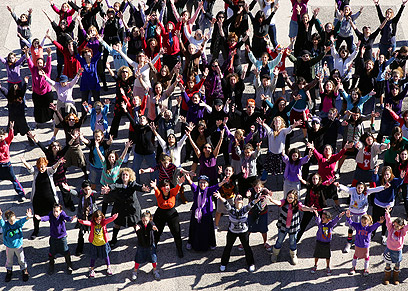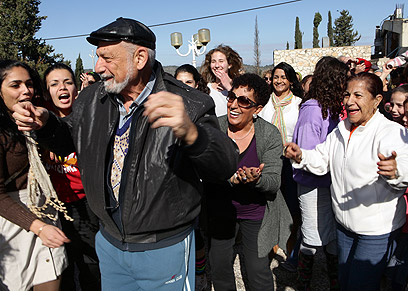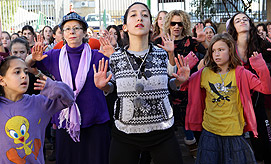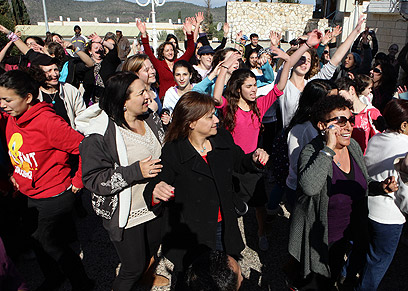Liron Nagler-Cohen
|
The song was not chosen randomly, and neither was the timing. "We had all kinds of ideas," says Miri Shalem, the project's initiator and director of the Ramat Beit Shemesh community center.
"We thought, for example, about Aretha Franklin's 'Respect' or 'I Will Survive'. It was important that the song would be in English, so that the message would be conveyed abroad too."
"I Will Survive" was eventually dropped, "because we didn't want a connotation of survival," says Shalem. The rhythmic Queen song was chosen by the choreographer, Liat Amar, and the rest is history.
A small Facebook group opened by Shalem and her friends Orna Nachmani, Etti Ben-Ami Suisa, Brenda Ganot and Paz Corcos spread the rumor, and many of the city's residents joined the initiative and even provided financial help.
'We wanted to present a different voice'
Flash mob is a way to convey a social message – and when religious and secular women dance together in the center of the city most identified with the exclusion of women, the message gets through.The initiators – all social activists who hold management positions – set up a "women's council" several years ago, whose members are ultra-Orthodox, religious and secular women, veteran residents alongside new residents.

Women dance in Beit Shemesh (Photo: Yissachar Ruas)
"In the past two weeks, Beit Shemesh has been making headlines in very negatives contexts," says Shalem, "whether on the background of separate sidewalks, a visit by the Knesset's Economic Affairs Committee on building reserves, or the story of Naama Margolese (an eight-year-old girl bullied by haredi men for being 'immodest').
"We wanted to present a different voice of many sane women who are against religious exclusion in the city, like living in Beit Shemesh and don't experience religious tensions every single moment."

Residents join dancing women (Photo: Yissachar Ruas)
"We were very unhappy with everything that's happened recently in terms of the exclusion of women," adds Orna Nachmani, manager of the Beit Shemesh seminary.
"It was important for us not to attack a certain public, but on the contrary – to come and say that we have a voice. We expressed our voice through the dance."
Brenda Ganot, a Jewish Agency project manager in the city, describes a situation of chronic depression. "Recently, women have been walking around here with their heads in the ground, and that's not good for one's soul. So we wanted to improve people's mood.
"I felt that it was very important to show the world that Beit Shemesh has an amazing communal organization. In the meantime, we live in a free city, where we can dance on the streets. We didn't do it in someone's face, that wasn't the goal, but there was a need to express something of a protest and positive nature at the same time. Something with good energies, which in my opinion only women can do."
Strong society
Even before the Naama Margolese affair was exposed on Channel 2 News, Beit Shemesh had already made headlines on the backdrop of the haredi struggle against a local religious school for girls.Shalem, who at the time was considering ways to express the voice of Beth Shemesh's women, fell in love with the idea of a mass flash mob.

'I don't know if it could be done in any city' (Photo: Yissachar Ruas)
"We worked on it for two weeks, and it turned out to be amazing," she says. "We hope this clip succeeds in explaining that Beit Shemesh is the home of a civilian society with a lot of strength. I don't know if this could be done in any city."

Religious and secular, veteran and new residents (Photo: Yissachar Ruas)
Nachmani says she was surprised, "not at the number of participants, but at the variety. When we saw the response to our Facebook group, we already realized that it was serious. And with all my experience in organizing events, in most projects of this kind you don't really know who will eventually show up. But in the rehearsal the evening before, when we saw the masses, we were very happy."
The initiators – all women in their 40s, religious and secular from different parts of the city – seek to convey the message overseas as well.
"There are thousands of Anglo families living in Beit Shemesh. There are difficulties here, but there is also a different reality. Now we are moving on, thinking about other initiatives to show that we can still create a sane reality here, despite the complex reality of Sephardim and Ashkenazim, veteran and new residents, radical haredim and seculars."
Women went on dancing
Ganot and Nachmani say the goal was achieved on the ground: "Women went on dancing spontaneously even after we completed the shoot," says Ganot."They just didn't want to go home. This shows that something happened here. Women of different backgrounds saw that together we have the power to do positive things."
Nachmani adds, "I felt high, with so much adrenaline and a great feeling. We felt like we had done something. After all, just complaining and crying is unhelpful."
"I hope we manage to protect our city. It's an amazing and beautiful place. If in the future I am no longer able to dance on the street, I won't be able to continue living here."
http://www.ynetnews.com/articles/0,7340,L-4173737,00.html
No comments:
Post a Comment